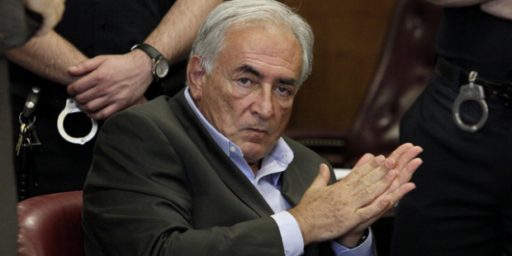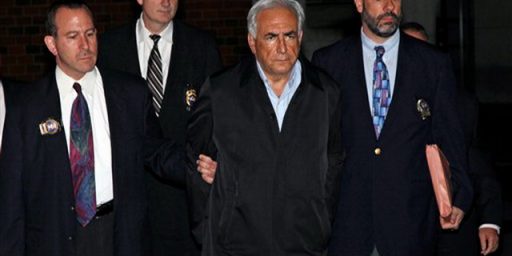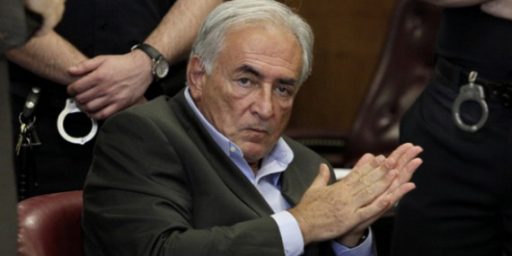Al Gore in Internet Hall of Fame Inaugural Class
Al Gore will be part of the inaugural class of the Internet Hall of Fame.
Politico (“No invention: Al Gore’s Internet honor“):
Former Veep Al Gore is now getting a bit of credit for his infamous 1999 claim that “I took the initiative in creating the Internet”: He’ll be one of the first inductees into the Internet Hall of Fame.
The names were announced Monday at the Internet Society’s Global INET 2012 conference in Geneva, Switzerland, and Gore was placed in the “Global Connectors” category for having “made significant contributions to the global growth and use of the Internet.”
The group’s description of Gore states: “Al Gore, the 45th Vice President of the United States, was a key proponent of sponsoring legislation that funded the expansion of and greater public access to the Internet. Instrumental in helping to create the ‘Information Superhighway,’ Gore was one of the first government officials to recognize that the Internet’s impact could reach beyond academia to fuel educational and economic growth as well.”
Other inductees: Paul Baran, Vint Cerf, Danny Cohen, Steve Crocker, Donald Davies, Elizabeth Feinler, Charles Herzfeld, Robert Kahn, Peter Kirstein, Leonard Kleinrock, John Klensin, Jon Postel, Louis Pouzin, Lawrence Roberts, Mitchell Baker, Tim Berners-Lee, Robert Cailliau, Van Jacobson, Lawrence Landweber, Paul Mockapetris, Craig Newmark, Raymond Tomlinson, Linus Torvalds, Philip Zimmermann, Randy Bush, Kilnam Chon,Nancy Hafkin, Geoff Huston, Brewster Kahle, Daniel Karrenberg, Toru Takahashi, and Tan Tin Wee.
While Gore remains the butt of snide jokes to this day because people believe he claimed to have invented the Internet–he actually declared only that “During my service in the United States Congress, I took the initiative in creating the Internet”–he was in fact ahead of the curve in seeing the potential of the medium. Robert Kahn, Vinton Cerf and others have acknowledged this and now Gore will be honored for his role alongside them.






I don’t get Linus Tovald’s inclusion. His work, such as Linux, was certainly important to the broader field of computer science, but I can’t think of anything specifically internet related he did.
How could Marc Andreessen not be on that list? How is John Chambers not on that list? Obviously they’re smoking something funny over there in Geneva. Or perhaps this merely is a cadre of left-wing academics projecting onto the rest of us their own sanctums of uselessness.
In government, he may well have been the first to see the internet’s potential. He certainly made a very significant contribution, both in congress and as VP – and part of his reward has been to have the the right repeat the “Gore said he invented the internet” lie year after year.
Isn’t the problem here terminology; he should have used the “World Wide Web,” instead of the Internet. The announcement uses the phrase ” Information Superhighway” which has never meant anything to me. I just remember being told my college dorm in ’86 was Internet-ready, which I had no idea what it meant. I assumed it was ready for HAL to be installed in each room — it was the University of Illinois after all.
@Tsar Nicholas:
You had me until the pro-forma ‘left wing academics’ talking point.
I agree, Andriessen and Chambers should be part of A-List.
@Stormy Dragon:
Maybe it was Linus’s championing (hell, he’s probably the father) of open source — without which there wouldn’t be an internet , or Web, (as we know them now, see, e.g., Apache HTTP Server).
@sam:
As I said, he was important to the broader field of computation for things like this, but the success of the internet really has very little to do with the Open Source movement in general. If you want to recognize specific open source projects, like Apache, that are important to the internet, why not pick the people actually responsible for Apache (none of whom made the cut) or Robert McCool, who developed the origina NCSA httpd daemon that grew into Apache?
PD Shaw – the www is not the internet, only one protocol running over it. When Gore helped fund t he internet, the web did not yet exist; I’m not sure if Gopher and Veronica even existed yet.
Although Eisenhower did not invent asphalt, he did create the interstate highway system. Although Gore did not invent tcp/ip and the associated technologies, he was instrumental in creating the taxpayer funded and government created internet. BTW – that is something that would never be funded or created today unless you could tie it to war on terror, and in that case, we surely could not open it to the public!
Another name that should be on the list: Peter Tattam, who wrote Trumpet Winsock, the first (and until Windows 95 the predominant) Windows TCP/IP stack, which was largely responsible to making the internet available to the general public rather than just to academics and government personell.
What about Keyboard Cat? Why are we not recognizing the contributions of our feline friends?
@Stormy Dragon: Beyond the entire open source thing, and the use of the internet in the entire development of linux, it should also be noted that linux is a key hosting platform as well.
That Marc Andreessen is not on the list does seem more than a bit strange.
@mattb:
Windows and Linux are rougly equally common among internet servers:
https://ssl.netcraft.com/ssl-sample-report//CMatch/Cosdv_all
So if we’re going to argue Torvalds should be included on that basis, Gates should be included as well. But the reality is that the OS particular computers run on has little to do with the Internet itself. Which (again, without downplaying the signifigance of Linux to the broader field) is why I don’t think Linux should be really considered as playing a critical role to the Internet itself.
@RWB:
Sure it did — they called it DARPA Net at the time, but it was quite alive and well.
I have no problem acknowledging Al Gore’s contribution to the Internet. The problem that “Geeks like Me” have with the wording is that he had no real contribution to the creation — whether you call it “invention” or otherwise — of the Internet. The basic technologies were well entrenched by then. His contribution lie in the expansion of what already existed — which is significant in it’s own right.
“Cry Havoc! And let loose the Electrons of the Internet!” – Al Gore. Or maybe not.
@mattb:
Also don’t forget that Linux didn’t really start showing up until the 2000-2005 time frame, which is pretty late in the game. If we’re picking OS’s that were critical to the development of the internet, BSD and Solaris were probably far more important.
No Marc Andreessen, but instead Mitchell Baker is on it?
Also, Craig Newmark?
Scott McNealy should be on this list too.
I guess I should just be glad Steve Jobs isn’t on the list, which would have made me barf.
Oh, and Vic Hayes (the “Father of Wi-fi”) should be on this list too.
@RWB:
Well, you could argue the original was only funded because they could tie it to the cold war (a network that can survive parts of it getting nuked and still function).
@John D’Geek: I think you need to check your facts on the Web:
@Stormy Dragon:
Maybe Hedy Lamar, too.
.
SunOs, I think, rather than Solaris.
@John D’Geek:
The Wikipedia entry on the world wide web starts with the statement “Not to be confused with the Internet.” This is a common mistake.
According to wikipedia “The first message on the ARPANET was sent by UCLA student programmer Charley Kline, at 10:30 p.m. on October 29, 1969”. This was the beginning of the internet. Also from wikipedia “A NeXT Computer was used by Berners-Lee as the world’s first web server and also to write the first web browser, WorldWideWeb, in 1990.”, this was the start of the web. The web runs over the internet, but it is not the internet. FTP runs over the internet, it is not the web. SMTP and POP3 run over the inter net, but they are not the web.
Like it or not, the US government is absolutely central to the development of both the internet and the World Wide Web. Not just in funding. The work of Al Gore’s committee was absolutely essential in moving it out from a government contractor tool to something available to everyone in the world. It may not jibe with your world view, but them’s the facts. (This is not meant to minimize the hardware and software advancements – of course they were incredibly important (“Routing around failure”? Sheer genius!). But they were important in making a robust network. There were other robust networks (TokenRing) that remained proprietary. Making DARPA/ARPAnet available to the world is something the people in the US government should be proud of.
@Stormy Dragon:
Ah, but note that Linux and Windows servers are equally common … because there is a Linux.
MS had a real shot at making a proprietary network around Windows and their AOL/Compuserve competitor. Was it called MSN in that time frame? I thought it had a different name.
Anyway, I find the argument that Linux/Apache defeated the proprietary networks pretty compelling.
So sure, a “hall” needs a few people. Put in Linus, and some Apache folks. I’m sure some are slotted for future inductions.
@RWB:
FWIW, my first personal internet account was with Cerfnet. Early 90’s.
I used a Mac, NCSA Mosaic, and SLIP.
@PD Shaw:
The key to understanding “information superhighway” is that that is the way it was sold to Al Gore, and in turn him to others.
You see, his dad helped create the “automotive superhighway” (interstates). It was clever of someone to pitch Al in the same terms.
What about Alaskan Senator Ted Stevens? Without him we would not have the system of tubes we now know as the interweb.
Well the Internet would be far better and more efficient if was privately invented and developed. Because the government is always wrong.
/Am I doing this trolling thing right?
@Franklin: You’re too late some of the old right wing trolls had already made those claims years ago.
@RWB: Yeah, sorry — I just lumped them all in one there.
My point, which you proved nicely, was that these technologies were all invented/created/well on their way before VP Al Gore took office in 1993.
@Franklin:
Obviously. Because I feel compelled to tell you that the internet was privately invented & developed. Feel better?
@John D’Geek:
Privately? Weren’t ARPA/DARPA funds in there very early on?
Yes, I see that an early name for the Internet Protocol was the “DoD Model.”
John D’Geek: I fear you will never be swayed by the facts. The reality is that there were lots of large scale networks vying for acceptance. Almost all of them were proprietary. A the same time the DoD funded development of one whose primary characteristic was that it could route around failure, which was considered vital in a shooting war (why isn’t this server responding? and what is that hole in the ground?). It also turned out to be really useful in everyday life with crashes, power outages, etc. The technological developers did a great job. But as much as you hate Al Gore, he had a vision and drove hard with it. It wasn’t him alone but he understood the importance. I know you can’t give him that credit, but it doesn’t change the reality.
@MarkedMan:
I think “shooting war” thing was more post-hoc than premeditation. Remember, DoD funded this type of networking to improve the efficiency of research and development, and never used TCP/IP in a tactical role (well, probably until very recently).
I think D’Geek is trying hard to overlook the true history though. The DoD funding was lift-off and stage one. It achieved a national, but low-capacity, network for universities and defense contractors. Gore’s contribution was funding to get the rocked in orbit, and build out that same architecture to a capacity suitable for millions and millions of end-users.
Hmm. I had read some dissent on the nuclear war thing, but fact-checking I see this:
@MarkedMan:
Hyperbole: 1, Facts: 0.
Reread my initial statement — I did give Al Gore plenty of credit. I’m not a fan of our former VP, but I don’t hate him. And his funding contributions were very important — which is why I agreed with him being included and said that they were important in their own right.
@john personna: Government funding is, in my book, not the same thing as “government developed”. Having worked for the government and as a government contractor, I can assure you that these are not the same things.
In this case, the technologies were developed outside of government laboratories. Check the Wiki and you will get the names of the first five or so that got the now universal technology — and none of them were government installations.
@John D’Geek:
I read a book lenght history, “where wizards stay up late,” and believe you are wrong, and/or splitting hairs. ARPA made ARPANET happen, androids the Internet Protocol. Bottom line.
@john personna: Splitting hairs? A Geek? Surely you jest! LOL!
That’s possible, of course, but I do consider it to be an important distinction. With university research and SBIR research that’s actually a critical distinction IMHO. For example, did the government invent/create the Roomba (iRobot)? iRobot gets a lot of funding, and much of that government funded research is in the Roomba. Where is the line drawn?
For me the line is drawn based on two questions: “Who did the actual work?” and “Who owns the IP?”
Mind you, the fact that it was all invented before AG was elected VP is still a critical point. As is the fact that AG was very instrumental in the form that the internet takes today.
Thirty-eight comments, and all of them are nerds.
@Tillman:
Go carve a quill
BTW, funny how my phone made “and the Internet Protocol” into an advertisement. A counter-productive advertisement at that.
@john personna:
Unless they open sourced a time machine, then no. The open network architecture was firmly ensonsced by the time they showed up. The battle you describe was important, but it was won by the generation of software before Linux and Apache.
@john personna:
I never said it was intended to be used to FIGHT a nuclear war. I said it was built to SURVIVE a nuclear war. Making your computer networks less vulnerable to a nuclear attack is an important military goal even if they aren’t necessary for the conduct of our side of that war.